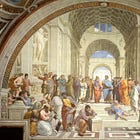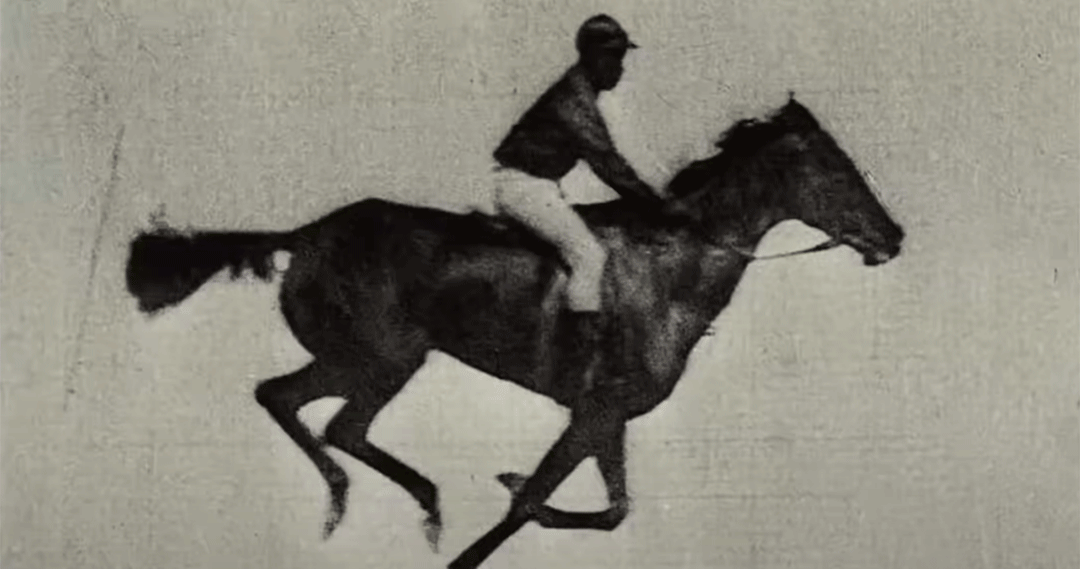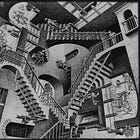"What is Real?" : Brains in Vats & Invisible Horses | Existential Basics 2
a Short Essay for the Modern Existentialist
[DEPRECATED]
BETTER VERSION HERE:

The reason people will tend to regard philosophers with a sense of skeptical ridicule … is because they’re not honest about their work. They pretend as though they arrive at their facts through a peerless, purely transcendent rationality—that, as opposed to the method of the mystics (who are both more sincere and also more stupid, and so instead lay claim to “divine inspiration”). Their “facts”, however, are fundamentally still opinions: feelings and assumptions—their own kind of “inspiration”. Most often they’re nothing but a desire of the heart distilled into abstraction, which the philosopher then seeks justification for only after-the-fact.
—Friedrich Nietzsche (ab. M. Hise)
1 | A Brain in a Vat
Here’s another question:
How can we know that we know truth—or anything, for that matter?
How can we confirm that the world that we see… is actually real in itself?
Last time, in:
I asked you, for the sake of argument, to just take my word for it. I said that I would assume for the moment that the world is real, and that the things which I perceive can, therefore—in a sense—be called “real”.
However, if we stop and think for a moment… an assumption is still just an assumption, right? How do we know that our data isn’t wrong—that our senses are completely reliable? That our world isn’t actually fake, or that maybe the world we see isn’t actually the world that is. How can we say, without a shred of doubt, that you or I aren’t actually trapped in a perfect simulation—that we’re not just a couple of brains floating in a vat, hooked up to a bunch of wires and cables in the middle of some mad scientist’s laboratory?
If our theory—that what we see when we look at the world lets us understand its properties—is actually just an assumption that we make… then how can it really be confirmed? If the world could be fake—if everything we think we see could actually be unreliable data—then what is it that makes our empirical assumptions any better than dogmatic ones?
What is it that makes science any better at answering our questions than just plain-old blind faith?
Well, that’s… pretty simple, actually. Come—let’s take a little trip down Thought-Experiment-Lane.
2 | Down at the Races
Let’s say that we’re down at the races—the Metafisica Park and Racecourse. The gates open up, and we’re ushered into the venue along with this huge, bustling crowd. I grab us some seats and a couple of beers, and then I sit you down between a young couple and this older guy who’s wearing the fanciest suit you’ve ever seen. I hand you your drink and this little silver token, and I tell you this:
Here, at the Metafisica, everyone is given only 1 token to bet with. Your goal is to win, and the prize is what we call “true freedom”—1 billion dollars.
You look out at the racecourse—you see only two lanes. Up on the scoreboard, there’s only two names. You squint a little, and you can just about make them out.
The name of the first horse is Verus—
The second horse, Phantasmus.
You ask me about the horses—about how you should make your decision. I point down to the end of the track, where you can see one brawny, majestic racing stallion lined up against the starting gate. I say this:
Well, they’re over there. That’s Verus, standing in the stall.
You ask about the second horse—and I say this in reply:
Phantasmus is the favorite. Everybody thinks that he’s going to win.
You ask where this horse is—if he’s going to be coming up to the gate any time soon—and I say this in reply:
Well Phantasmus is invisible—nobody’s ever seen him before. That’s part of what makes him so great—you just never know for sure where he is. How could you beat that in a race?
You’re quiet for moment, then you ask if I’m crazy—if I’m sure this second horse even exists. I point down at the track again, and I say:
Look—there’s two gates and two lanes out there on the track. Why else would it be set up like that unless there were two horses to race?
You look around, and you realize that the young couple beside you are both wearing Phantasmus t-shirts. The man in the suit casts his lot for Phantasmus, leaving you dumbfounded.
You look up at the scoreboard—
The clock is ticking down.
You have 10 seconds left to decide.
You look down at the track, and you see that one of the starting stalls is still completely empty—
Or, at least… so you think.
“True freedom”—one billion dollars—is what’s on the line.
Which horse do you choose… and why?
Well, let me tell you how I’d decide.
We can’t bet on Phantasmus—at least, not rationally. That’s because we have literally no information about this horse that we can confirm—because we know nothing about it aside from the fact that everyone seems convinced that he both:
Exists, and
Will win
Not so fast, though. As far as you know, nobody seems to really be able to justify their belief. What if they’re all wrong? What if this is fraud and they’ve all been tricked and lied to—or, what if they’ve all just fallen for the rumors and hype of the Phantasmus fandom? It only ever makes sense—it’s only ever rational—for us to bet on Verus. Even if there’s a sense in which our perception may be unreliable—a sense in which technically no horses are ever real—the only data that’s ever actually available to us is information that can be either perceived or inferred—and only one horse present can actually be perceived; and that horse… is Verus. The only information that you can infer about Phantasmus… is that nobody else can perceive him either.
What if we are wrong, though? What if Phantasmus is actually real—actually the magical invisible horse that turns his jockey invisible too? Well… we can’t know that—nobody can know that, to any degree of certainty—which means that we can’t rationally trust the judgement of anyone who tries to tell us that they can.
Nobody can know anything for certain—therefore, we must trust Verus. Verus, after all, is the only horse present that we can actually see—the only horse present in which we can have any small degree of certainty. Phantasmus, after all, might actually be a real invisible horse—but nobody will ever have the ability to confirm that for themselves. We could never guarantee—even if he were real—that he was ever actually anywhere at all. We could never say for certain that, at the start of the race, he would even be standing in his stall.
When it comes time to bet, we can never be certain. We can never know that we know what’s real. The best we can ever do is make an educated guess—to form a theory from the data we believe we perceive, and from information we assume to be true and real.
The goal of science, after all, has never been absolute certainty. Instead, it has only ever been to be certain to the best of our ability.
3 | Faith and Fantasy
Truth can’t be an inherent property. That would be impossible to claim or prove—after all, inherence can’t be observed or inferred. We can’t know anything to be absolutely true, because…
Truth is knowledge that we create.
The only way that we can see the world is the way that we imagine it.
Our perception is a fiction—a subjective fantasy which we project onto the world. We perceive through faith—we choose to believe that the things which we see are real.
Truth is a value—a name that we assign to things which we believe are true. That’s how we create it:
Through our faith in the idea that our perceptions are real.
To exist is to live as a subject—to live by faith and fantasy. To take data from appearance—from what we perceive—and to use that to build a fiction for ourselves; to believe that the fiction which we perceive is, itself, the truth—and is what makes up reality.
Our reality is a fiction—therefore, our fiction is our reality.
We can’t perceive what’s beyond our perception. That’s… implicit in the concept itself. Therefore, the only rational way in which we can live is by assuming that our fiction is truth—through faith and belief that our fantasy is an accurate representation of reality. The fiction we create, after all, is the only thing—at least, to the best of our knowledge—that we will ever be able to experience at all.
4 | Conclusions
Now, let’s go back to the start—to the idea of brains in a vat.
The question is this:
Could we be trapped in a perfect simulation?
And the empirical answer which we’ve arrived at is:
Yes, we could—and… we are.
We are trapped in a perfect simulation—a fiction and a fantasy that we can perceive only through the lens of our biology. But we need to keep in mind that that’s not really… significant at all—not any kind of… reality-bending, world-altering revelation. That instead, that’s just literally the way it’s always been—the way that we, as human beings, have always existed. That, in the end, it’s not anything more than just what we would call… perception.
Your brain is trapped, floating in a vat…
But that’s just what we’d call… your skull.
The simulation is nothing more than just the way that we perceive.












Hi Mark.
I am confused when you say that Truth cannot be inherent.
Do you mean that Truth cannot be objectively known of anything? So that what we are certain of is Fact, and not Truth?
For example, are you saying that "a circle is circular" is just a Fact, and for us to think it Truth would either be false or a conjecture of language.
Now to avoid the culture or language bias, I could then say "a circle is what it is". If you still insist that that is just a Fact, you are essentially saying that there is no such thing as "truth", or truth is always subjective.
My next question to you would then be, what is a Fact? Can we know with absolute certainty what a Fact is?